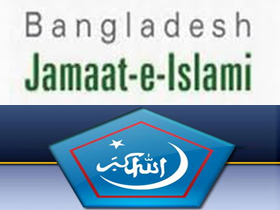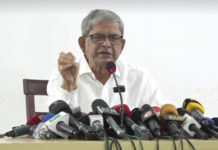‘If Bangladesh banned religious-based political parties, Jamaat will emulate the response of religious-based political parties in Turkey’
After failing to oust the government from office and halt the trial of its leaders for 1971 war crimes, the Bangladesh Jamaat-e-Islami’s “wait and see policy” belies the long-term preparations the party has made to survive.
Jamaat leaders said they are waiting to see if the government actually bans the party. If it does, party bosses say they will re-establish it with new faces in the leadership under a new political platform, on the model of the Turkish Islamist political parties.
The Dhaka Tribune has learnt that the party will not come out of its quiescence at this time but will wait for the government’s next move.
One section of the party, led by the business wing of party, wants to modify the party on the lines of the Turkish Justice and Development Party (AKP).
Another section, led by former Chhatra Shibir members, prefer “direct action,” a euphemism for street politics and violence.
The past
In 2013, the Election Commission cancelled Jamaat’s registration, stripping the party of its right to take part in any kind of election as an organisation, following a court order that ruled that Jamaat’s constitution was not in compliance with the country’s constitution.
This is not the first time the party has faced a major crisis. Jamaat has always been on the wrong side of Bangladesh’s history.
Jamaat was banned after the Liberation War. In the parliamentary elections of 1979, six of its members were elected under the banner of the Islamic Democratic League.
Since then, Jamaat has sought to gain legitimacy and popular support.
The right-wing political party has made strategic alliances with both the BNP and Awami League at different points of time.
Jamaat’s violent reaction to the death penalty awarded to its leader Delawar Hossain Sayedee drew massive criticism across the country and from around the world.
Further violent campaigns ahead of the January 5 general elections and this year has again drawn widespread criticism.
Hundreds of people were maimed and burned and over a hundred killed in the BNP-led alliance strike and blockade programme of 2015. The Islamist political party, whose activists helped enforce unpopular the strikes with firebombings, share in the blame for the carnage of the 90-day “movement.”
There is vocal international pressure for the BNP to put an end to its dealings with Jamaat-e-Islami. The European Union has publicly asked the BNP to sever its ties to Jamaat.
The present
Currently, the acting ameer of Bangladesh Jamaat-e-Islami is Maqbul Ahmed.
His leadership team includes Central Nayeb-e-Ameer Mujibur Rahman, acting Secretary General Shafiqur Rahman, Central Executive Committee member AHM Hamidur Rahman Azad, Central Publicity Secretary Tasnim Alam, Central Executive Committee Member and Dhaka city unit President Rafiqul Islam Khan.
Also influential in the party are Central Executive Committee member and Dhaka city unit Secretary Nurul Islam Bulbul, Central Executive Committee member and Dhaka city unit Assistant Secretary Selimuddin, Central Working Committee member and Assistant Secretary of the Dhaka city Jamaat Monjurul Islam Bhuiyan and Central Working Committee member and Dhaka city unit Nayeb-e-Ameer Maulana Abdul Halim.
Central Jamaat leader Redwanullah Sahedi
is the party’s key liaison officer with the Bangladesh Nationalist Party (BNP) and typically represents his party at alliance meetings.
On the party’s silence over the trial of its top leaders, Imran Hossain, Ameer of Khulna district Jamaat, said: “There is currently no way we can enforce a systematic and democratic movement. We cannot behave like a terrorist party because, worldwide, Islam is branded as ‘terrorist.’ There is no use wasting energy. We are waiting with great patience.”
The future
According to a US embassy cable leaked by whistle-blower website WikiLeaks on September 1, 2011, the party already had a back-up plan ready in the event of a ban or a cancellation of registration.
On February 10, 2010 Jamaat Assistant Secretary General Abdur Razzaq, who is also the chief counsel for the party leaders facing war crimes charges, briefed the then US ambassador in Dhaka James F Moriarty about how the party would re-emerge if declared illegal.
“If Bangladesh banned religious-based political parties, Jamaat will emulate the response of religious-based political parties in Turkey. Jamaat will rename itself and remove religious tenets from its constitution, but will at the same time challenge the ruling in court,” the cable reads.
The main theme of a recent intra-party presentation was to float a new political party on the model of Turkey’s Justice and Development Party, known as the AKP, with the avowed objective of promoting public welfare, good governance, safeguarding the independence, sovereignty and territorial integrity of the country, protecting the nation’s economic interests, in particular safeguarding gas and other mineral resources.
A workshop paper from July 2009 also recommended that the proposed party distance itself from demands for a theological state and strict compliance with Shariah law in public life.
Regarding changes to the party leadership, Aminul Islam Khoshru, acting nayeb-e-ameer of the Barisal city unit Jamaat, said: “This issue has been discussed at various meetings of the party but there is nothing definitive to say about it yet. We discuss and analyse the political situation – but these are just thoughts.”
Imran Hossain, said: “We have experience with the banning of political parties. In Egypt, the Muslim Brotherhood was banned 40 years ago – when democracy was restored to that country, the Brotherhood came to power. We are not frustrated … We are observing the situation with great patience.”
Source: Dhaka Tribune










